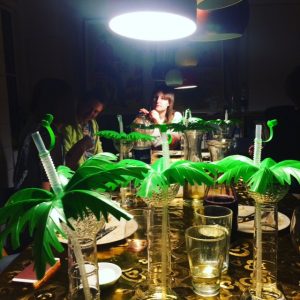Carima Neusser
» OUR NEED FOR CONSOLATION

Choreographer Carima Neusser is organizing Our Need for Consolation in collaboration with Vision Forum and Tomorrow’s Art Audience. Our Need for Consolation will carry out three workshops in Denmark, Sweden and Finland. The work will reflect on the following problems:
– How can art become more effective in supporting the general public to have meaningful existential reflections in their lives?
– What is specific about Nordic metaphysical reflection (its famous gloom)? Are there specific qualities in Nordic languages and writing that make shape our culture?
– Why is ageing and death so hidden away in contemporary society? Would more dynamic discussions between the young and the old be desirable and death more present in our lives?
The project takes its starting point from Stig Dagerman’s text ‘Our Need for Conciliation,’ which offers important tools to address the above problems. Through its reflection on how to fill human existence with meaning, it uses a language that is specifically Nordic and opens for discussions about difficult metaphysical questions. These reflections gives the group ammunition for developing performances and opens for discussions how these can encourage to a broader discussion about existential exchanges in society. The text’s questions about the meaning of literature opens for discussions on artistic production and the autonomy of artistic language. With its examples about human interaction, it also offers important inspiration for performance practices.
The workshops includes readings, discussions and various performance exercises continuously moving between theory, practice and using methods developed by Tomorrow’ Art Audiences. It gives a broad spectrum of young artists and academics the possibility to try new and challenging performance expressions and to develop new practices, collaborations and exchanges between Nordic artists and students. The work will contribute to young people’s curiosity and understanding of other Nordic countries, their languages and cultures. The project also encourages a diversity in society in terms of gender identity in relation to cultural and ethnic background as well as functional ability.
The work gets its energy and pertinence by bringing together diverse knowledge of the partner organisations in Sweden, Norway, Denmark and Finland. Our partner in Copenhagen has unique knowledge about conviviality and performance; while Vision Forum has unique know-how about education and artistic production. The consortium in other words stands strong to make then meetings meaningful and productive as well as very well prepared for finding new solutions to the above problems.
The project deliberately brings together performance artists with academics, which will force the group to reflect on how performance art can become better at mediating their artistic practice to non-artists. Through reflections on depth and superficiality, the workshops will also lead to reflections on social media, big data and how these can deepen the crisis in western democracy. Even though these questions were not present in Dagerman’s text, he wrote it just after the second world war and when the world had been rocked by a long war which was the outcome of overthrown democracy. The project therefore also activates Nordic history and how Sweden, Norway and Denmark dealt with that situation and gives us ideas how to learn from history in order to deal with current problems.
Dagerman’s text makes allusions to the sea, therefore the meetings will take place in cities where the sea plays an important role in the every day life. Each meeting brings together 15-30 young artists and academics together with experienced artists and workshop leaders. They will work in institutions and in the public space of the three cities. A core of the participants will participate in all three workshops, but local artists and academics will also attend individual exercises
Participants in the project: Vanessa Virta, Sara Gurevitsch, Tuuli Malla, Emmi Venna, Alex Rosa, Karon Jonson, Solveig Styve Holte, Ann-Christin Berg Kongsness, Agnes Due, Simone Bang Jørgensen, Emil Krog, Emilia Gasiorek, John Andrew, Per Huttner, Carima Neusser, Gry Tingskog and Stine Frandsen as well as support by researchers Lars Palm and Eva Cronqvist.
The project is supported by Stockholm Stad and 1/17 Volt at Nordic Culture Point.